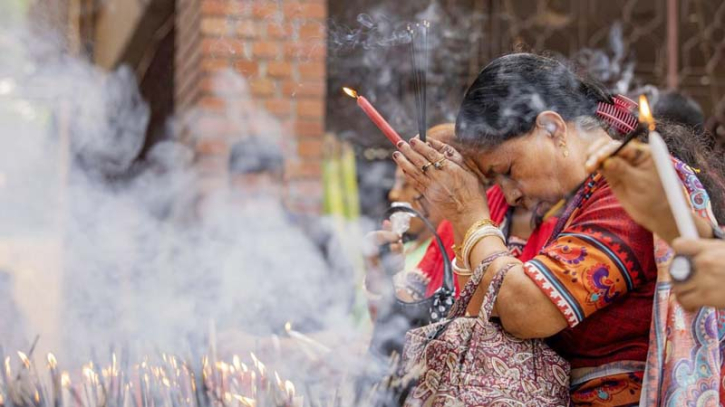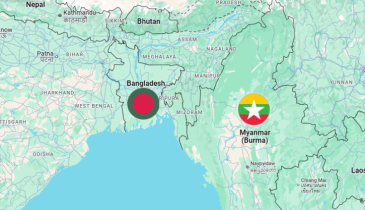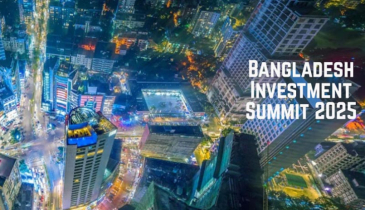Communal Harmony in Bangladesh must be maintained

Bangladesh is a country of multi-ethnic culture where people belonging to different religious, racial, cultural, and lingual identities live together harmoniously. Religious harmony has existed in Bengali culture for thousands of years. In Muslim-majority Bangladesh, the Hindus continue to remain the second-largest religion, constituting around 10 percent of the population. Buddhists and Christians also live in great harmony. For centuries, these communities have coexisted, contributing to a shared cultural and social heritage. Festivals such as Eid, Durga Puja, Christmas, and Buddha Purnima are celebrated with equal enthusiasm, transcending religious boundaries and creating a shared sense of national identity.
Notably, Bangladesh is known for communal harmony, which has to be maintained. People of different religions, castes, and tribes living together in peace, harmony, and a friendly environment have set a shining example of brotherhood on the soil of Bangladesh. Hindus and Muslims in this country have been coexisting peacefully for ages, transforming Bangladesh into a non-communal society and democracy. However, in recent years, there have been some alarming incidents of violence against minority groups, often sparked by rumors on social media. In this context, it is worth revisiting Bangladesh’s rich tradition and emergent challenges to communal harmony.
Bangladesh’s communal harmony
Communal harmony means that people of different religions, castes, creeds, sexes, and backgrounds live together in society with love and peace amongst them. Thus, community harmony strives to create goodwill and harmony among various communities. The aim is to foster an ethic of coexistence rooted in or inspired by religious and cultural values. However, maintaining communal harmony requires continuous effort. Successive governments have had to address challenges posed by radical elements and external influences that seek to disrupt this balance. In response, Bangladesh has repeatedly reiterated its commitment to secularism, religious tolerance, and inclusivity, aiming to build a society where extremism and intolerance have no place.
Moreover, communal harmony is the hallmark of democracy in a country governed by the rule of law. The government of Bangladesh followed a policy of ‘zero tolerance’ to militancy and violent extremism which has further enhanced religious and communal harmony and tolerance in the country. The Durga Puja celebrations, considered to be the biggest religious festival of the Bangalee Hindu community, have expanded to every corner of the country. According to Bangladesh Puja Udjapan Parishad, the puja will be celebrated at 32,666 permanent and temporary mandaps across the country in 2024, including 257 in Dhaka. In 2016, the number was 29,395, including 229 in Dhaka. The increase in the number of puja pandals in Bangladesh has been visible due to the harmony that Hindus, Muslims, and members of other religious groups are enjoying in the country.
While Bangladesh has made remarkable progress, it has also faced challenges in maintaining communal harmony. Incidents of communal violence, religious intolerance, and the targeting of minority communities have, at times, threatened the country’s unity. Such events, although isolated, underscore the importance of vigilance and proactive measures to ensure that the nation’s social fabric remains intact. These incidents remind the nation of the need for consistent efforts in promoting interfaith dialogue and community-building activities. It is worth mentioning that the government has often taken steps to address communal tensions, promoting interfaith dialogue and religious tolerance.
Communal Harmony in Bangladesh must be maintained
Although peace is a priority for all religions, there are surely a few political opportunists who put self-interest above all else and try to profit off the public’s adoration of religion. Through inciting resentment and animosity against the minority group, the vultures operating behind the scenes want to see violence break out between Muslims and Hindus in the country. A disjointed society is a vulnerable society prone to machinations of internal and external foes. So, the vested groups strive to fish in the murky waters of communal discontent, sowing social conflict and destabilizing society.
Eighty-six percent of respondents to a recent study think misinformation, particularly on social media, impacts communal violence in Bangladesh. Perhaps, the ‘rumor-instigated attacks on temples’ are the biggest concern for Bangladesh’s communal harmony. During the religious festivals, fanatics and extremists spread rumors on social media about potential blasphemy that enrages the common people resulting in violence and attacks on minority people. The attack on the Buddhist Community in Ramu in 2012, the attack on the Hindu Community in Cumilla in 2021, and the Nasirnagar incident of 2016 are some of the incidents that put a strain on Bengali’s thousand years of practice. To avoid further incidents, the government is relying on rounding-up security during religious events and installing CCTV to monitor the overall situation.
While Bangladesh has seen its share of communal tensions, its history, culture, and the efforts of many dedicated individuals and organizations ensure that the pursuit of communal harmony remains an ongoing priority. For lasting peace and stability, promoting tolerance, equal rights, and dialogue among different religious communities will continue to be essential. Various initiatives have been aimed at protecting minority rights and promoting inclusivity. Civil society organizations, religious leaders, and activists in Bangladesh work actively to promote peace and harmony among communities. Many grassroots movements focus on education, cultural exchange, and conflict resolution to sustain communal harmony. Encouraging responsible journalism and addressing hate speech and misinformation, particularly online, is crucial to preventing communal violence.
Communal harmony is paramount in any country that has multiple religions and communities. Communal harmony is not just an ideal but a necessity for Bangladesh’s continued progress and stability. The country’s strength lies in its diversity, and embracing this diversity through tolerance, respect, and understanding is essential for building a cohesive society. While challenges remain, Bangladesh has shown resilience and commitment to maintaining peace among its various communities. By fostering a spirit of unity in diversity, Bangladesh can continue its path toward sustainable development and peace, setting an example for the region and the world. The future of the nation depends on the collective effort of all its citizens, united in their resolve to uphold the principles of harmony, equality, and justice. -Source: pressenza
.png)









